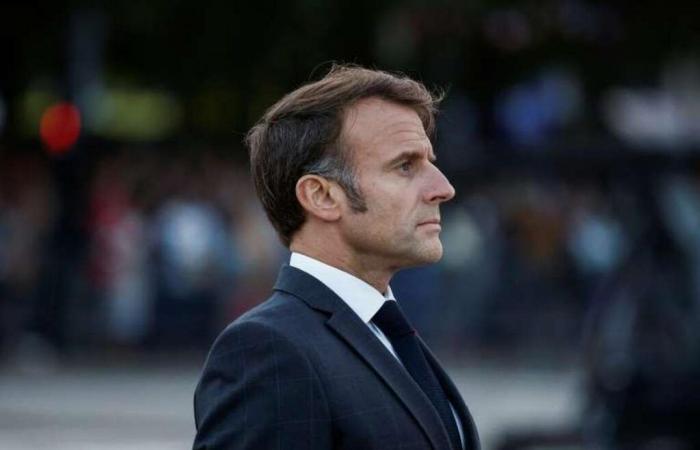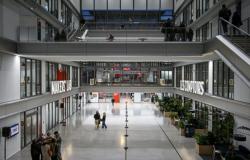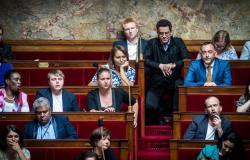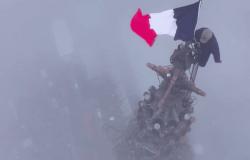“For his work, his teaching and his courage, we decide that Marc Bloch will enter the Pantheon,” declared the head of state at the University of Strasbourg where Marc Bloch taught.
The president praised his “scathing lucidity which still strikes us today”, his “audacity of words and ideas which was coupled with physical courage” and his “French will until his last breath, until the assassination by the Gestapo.
Emmanuel Macron also presented the Legion of Honor to his son Daniel Bloch.
“The family is very moved and completely satisfied with this entry into the Pantheon. We hope that this tribute which will be paid to him will make it possible to make his work known better and more widely,” reacted to AFP Hélène Seguret, 50 years old, great-granddaughter of Marc Bloch, after attending the president's speech.
Recalling that Marc Bloch was a professor, father of six children and “very attached to young people”, she hoped that the latter would be “very involved” in this tribute.
In a letter to the President of the Republic, of which AFP obtained a copy, the family also requests that “the extreme right, in all its forms, be excluded from any participation in the ceremony” of entry into the Pantheon.
Coming from an Alsatian Jewish family, professor of medieval history at the University of Strasbourg from 1919 to 1936, Marc Bloch profoundly renewed the field of historical research by extending it to sociology, geography, psychology and economics.
Captain and Croix de Guerre in 1914-1918, mobilized again in 1939, Marc Bloch joined the resistance at the turn of 1942/43.
The author of “The Strange Defeat”, written in 1940 and published after the war, was arrested in Lyon on March 8, 1944, imprisoned and tortured in Montluc prison, then shot on June 16 with 29 of his comrades.
– “Despite us” –
During his speech at the University Palace in Strasbourg, Emmanuel Macron also mentioned the “Despite us”, these 130,000 Alsatians and Mosellans considered German after the annexation of these territories, and who had to integrate the German army.
Their “tragedy must be named, recognized, and taught because it is that of the Nation”.
“These children from Alsace and Moselle were captured, dressed in a uniform that they hated, in the service of a cause which made them slaves, instruments of a crime which also killed them, threatened with reprisals if they attempted “They sometimes also included among their ranks lost children who took up the evil cause of the Reich,” declared the president.
“We must recognize the suffering that the former suffered, that the latter in their small number caused, this suffering for which the primary responsibility lies with the Nazi regime.”
For a very long time, the “Despite Us”, associated for some with one of the worst massacres of civilians committed by the Nazis in Western Europe in Oradour-sur-Glane (Haute-Vienne) in 1944, remained a relatively taboo subject.
The incorporation of force is “something that has always been misunderstood,” Jean-Marie Hostert, 99, one of these “Despite Us,” told AFP. “We didn’t want to go,” explains the nonagenarian, present on Saturday for the commemorations.
Emmanuel Macron, who continues a long memorial cycle around the 80 years of the Liberation of France and the end of the Second World War, then goes about sixty kilometers from Strasbourg, to the former Nazi concentration camp of Natzweiler -Struthof, the only one erected on French territory while Alsace was de facto annexed by the Third Reich.
This day of commemoration began with a military ceremony in Strasbourg, where the Head of State saluted the memory of General Leclerc and the men of the Second Armored Division, liberators of Strasbourg on November 23, 1944, after swearing three years earlier during the oath of Koufra (Libya) to fight until the French flag flies over the capital of Alsace.
“When we knew that the flag was on the cathedral, we had achieved our goal, freedom, to liberate Alsace, a province dear to the heart of the 2nd DB,” Roger Le Neures, 101, told journalists. volunteer resistance fighter in the Free French Forces (FFL) and the 2nd DB, present on site.
As a nod, the colors of France were once again raised on the spire of Strasbourg Cathedral.
Source: AFP






